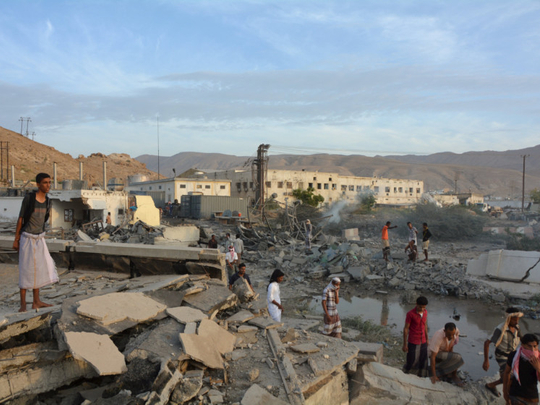
Washington: The US military now plans to keep a small force of Special Operations advisers in Yemen — deployed in April for a limited, short-term operation — for the foreseeable future, a step toward re-establishing a counterterrorism mission that was shut down last year by civil war.
US officials, speaking on the condition of anonymity to discuss sensitive operations, said the team of about a dozen men would assist troops from the UAE, who, along with other Arab forces, are seeking to track down militants from Al Qaida in the Arabian Peninsula (AQAP), the most potent affiliate of the main Al Qaida group.
The Pentagon recently dispatched another Special Operations team to Yemen on a separate mission to assess security and size up local figures who might cooperate with the US in the future.
The decision to extend the US troop presence around the city of Al Mukalla, which Emirati and Yemeni forces recently recaptured from AQAP, returns US troops to a country that had been a major focus of counterterrorism operations until intense factional fighting forced the withdrawal of US forces.
While the United States has continued to carry out occasional air strikes against AQAP, a renewed, on-the-ground presence would provide greater visibility into the array of armed groups across Yemen and provide the US military flexibility to partner with local forces on a range of missions, as happened in the past, officials said.
In April, at the request of the Emirati government, the United States placed the small Special Operations team in Al Mukalla, an important port city that had been in Al Qaida’s hands for more than a year. The Emirati troops are part of a coalition led by Saudi Arabia that has been battling Shiite Houthi rebels across Yemen since 2015.
Offshore in the Gulf of Aden, US ships from the USS Boxer Amphibious Ready Group, including the 13th Marine Expeditionary Unit, sent aircraft and commandos to Al Mukalla to support the operation there. On the ground in Al Mukalla, the US forces provided intelligence support and helped Arab troops identify militant targets.
When the small ground presence was made public in May, Pentagon officials said the US troops were “providing limited support” to Arab troops in and around Al Mukalla.
But the Al Mukalla battle ended more quickly than expected. Instead of defending the city, many militants fled into the surrounding countryside.
Last week, the government of the UAE announced that its troops had achieved the government’s main military goals in Yemen: securing the strategic city of Aden and dealing a blow to AQAP in Al Mukalla.
Yusuf Al Otaiba, the UAE ambassador in Washington, said Emirati forces were working with Saudi and Yemeni forces in an ongoing effort to track down AQAP fighters across Yemen. He declined to say how many Emirati troops would take part in that mission.
“I imagine it will go on for a long period of time,” he said. “The military priorities have shifted from fighting the Iranian-backed Al Houthis to being more focused on AQAP.”
Saudi Arabia and the UAE have accused Iran of using Al Houthis to stoke a proxy war.
Al Otaiba said that US assistance was valuable to Emirati military efforts. “Remember, we are fighting a common enemy,” he said.
The US troop presence, though small, is a significant turning point in the US strategy toward Yemen following the collapse of the Yemeni government in late 2014. Al Houthi rebels overran the capital, Sana’a, and, shortly after, the Pentagon withdrew the contingent of special operators who had been advising their Yemeni counterparts at Al Anad airbase near Aden.
The departure was a significant setback in the US campaign against AQAP, which has repeatedly sought to carry out terror attacks against the West.
Stephen Seche, a former US ambassador in Yemen, said that a new commitment of US forces in Yemen would better enable reconnaissance flights and air strikes against Al Qaida.
According to Seche, now executive vice president of the Arab Gulf States Institute, a Washington think tank, Yemen’s rough geography has allowed AQAP to move freely.
The US would benefit from a continued partnership with the UAE, Seche said, since that country had a strong sense of urgency in the fight against AQAP.
“If the UAE is there and capable, why wouldn’t we [help them continue to go after AQAP]?” another US official said. “We’re going to do what we can.”
Brig. Gen. Ahmed Asiri, a spokesman for the Saudi-led military coalition, said that Saudi Arabia and its allies are working to manage Yemen’s ungoverned spaces to prevent militant forces from regrouping.
“By increasing the presence of the Yemeni army and government ... you deny Al Qaida a safe haven,” he said in a recent interview.
Asiri said the primary US contribution had been intelligence and the deployment of “certain elements” to assist Arab-coalition and Yemeni forces.
He added that the US military had not shared any plans for a longer-term presence in Yemen but said that Saudi Arabia generally supported any enhanced cooperation with the United States.
The US has been helping Riyadh in its battle against Al Houthi rebels from the beginning, providing surveillance flights and aerial refuelling, but officials have tried over the past year to focus the operations there more directly on AQAP.












